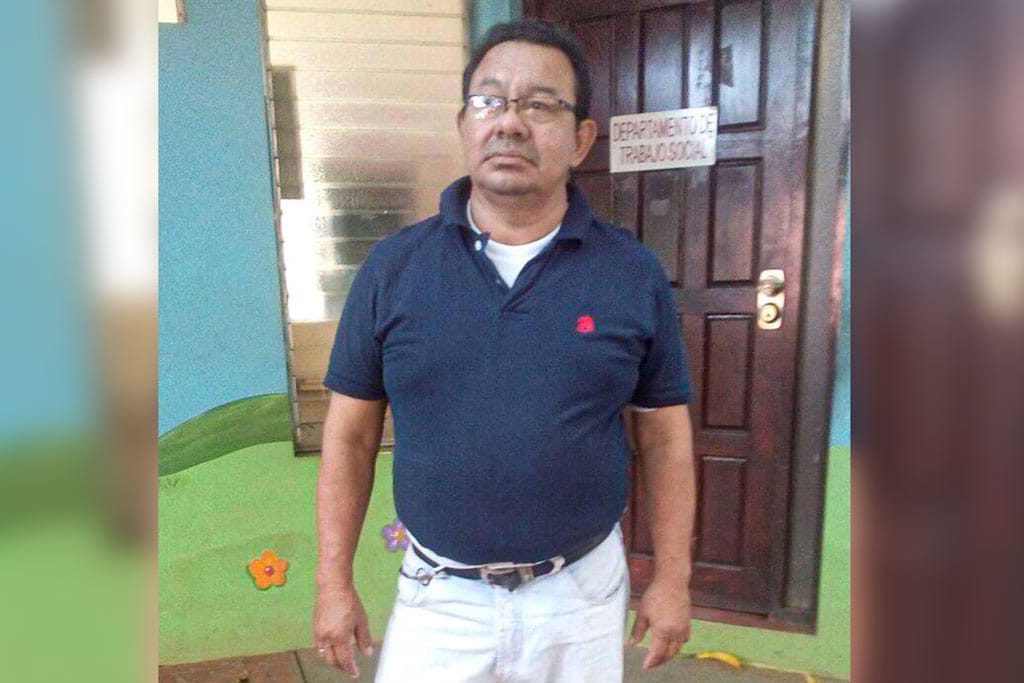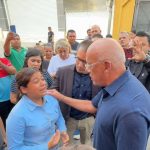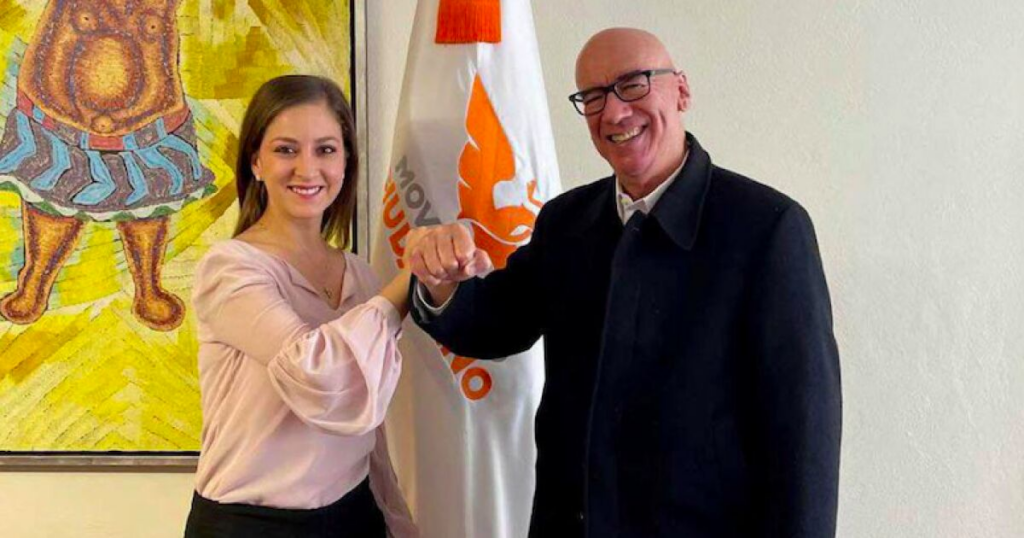Donald Margarito Alvarenga, a 56-year-old Nicaraguan who acknowledged being an opponent of the Daniel Ortega regime, was formally sentenced to seven years in prison in a political trial, becoming the first convicted under the Special Cybercrime Law and the Law for the Defense of the Rights of the People to Independence, Sovereignty and Self-Determination or Law 1055, approved by Ortega in a package of repressive laws used to direct his political hunt in 2021.
The judge of the Penal District of Chinandega, Rosa Velia Baca Cardoza, sentenced Alvarenga, arguing that he committed the crimes of “subversion, disobedience and rebellion at the level of conspiracy to affect national integrity.”
Norwin Cruz Ponce, defense attorney for Alvarenga, in an interview with the programto This week –broadcast on Facebook and YouTube due to the regime’s censorship– explained how Judge Baca Cardoza did not take into account the inconsistencies in the alleged evidence presented by the Police and the Public Ministry, when establishing her resolution of the case.
Cruz Ponce also points out the irregularities that occurred at the time of the capture of Alvarenga by the National Police, and how this entire process reveals that, in Nicaragua, thinking with criteria and independence is an act persecuted by the regime.
On January 13, Donald Margarito Alvarenga became the first citizen to be sentenced under the Special Cybercrime Law and Law 1055, which charges him with treason against the fatherland. What was the evidence presented by the Prosecutor’s Office to accuse him of these crimes?
The day I am allowed a copy of the file, I realize that all the witnesses were police officers. That was the evidence they had and they offered this expert report on a phone that was owned by him. The police witnesses, who were seven, and the telephone. It was a titanic audience that began at approximately 10 in the morning and ended at 12:00 at night. I was not allowed a private interview with my client, because even though I was able to speak with him at the hearing, an agent from the Penitentiary System was always present. It is a right that all defendants have within the constitutional guarantees to have a private interview with their defender.
He was arrested on November 6, the day before the elections. When he was arrested at his home and taken away, a policeman came back on a motorcycle and seized his phone from the house. Article 44 of the Political Constitution establishes the right of every person to the privacy of their assets. The phone is a private good. The man is caught in his house. They don’t arrest him let’s say,’red-handed, in the commission of a crime, therefore, the law has certain limits. I could violate your right to freedom if he really caught you ‘red-handed. Likewise, the right to property must be inviolable and can only be seized with a court order, which there was not.
Mr. Alvarenga was arrested on November 6 without a court order, first they arrest him, then they seize his cell phone and then they take the alleged evidence from the cell phone, is that legal?
They speak in the accusation that they were monitoring him since 2019, but the law with which they condemn him was enacted at the end of 2020. So there is an injury to the principle of retroactivity established in the Political Constitution. In addition, the Constitution says that those tests that are obtained illegally will have no value. In other words, if Margarito (Alvarenga)’s phone was not withheld with a court order, everything that occurs from that moment is null. However, what do they discover on the phone? Computer experts from the Police arrived and they say that they look at issues that are adverse to the Government, publications that according to the Special Cybercrime Law in article 30, refer to false or distorted news. So, first of all, it had to be shown if they were true or false, and most importantly, to know who published them, because it appeared in a WhatsApp group called Los Pingüinos.
What are the means of evidence supposedly presumed by the Police?
There were WhatsApp and Facebook posts, but it is not shown that they were actually posted by Don Margarito. What’s more, some assertions of criticism of the Government are made in a group called Los Pingüinos, but not precisely the number of Mr. Margarito. Even he, when the trial ends at 12 o’clock at night, takes the floor and tells the judge that ‘I cannot take care of publications that are sent to my phone’.
The Prosecutor’s Office also presented the testimony of seven policemen. What do these policemen say, what was their testimony?
Big inconsistencies. They began to do the interrogation, but when I participated in the cross-examination, I stated that the facts that they put in the accusation do not agree with the substantive criminal regulations that Mr. Margarito is charged with. In the case of the alleged crime of false news, there is a component so that the crime can be constituted. It is not enough to make the publication, which can also be from some sector of the population, the family, etc. But we are talking about whether that publication produces affectation, instills fear, alarm; that is, we are talking about whether there is an emotional affectation. I asked the investigator and the other witnesses who investigated, if they were able to verify in the first place, which were those victims who were in fear because of the publication that Don Margarito supposedly made, and if a professional determined that emotional affectation. They said something else, but in the end the court ordered them to answer my questions, so they said no. They justify that how they were going to go to half of the population of Nicaragua that was psychologically affected by the publication. The problem with them is that they had to prove it. It is not that everything is done under an assumption. It was not necessary to bring half of Nicaragua, as they say. Just by bringing several people and showing that they had an emotional affectation through a forensic medical opinion, which they did not offer.
Did the Public Ministry present a list of the publications in which Alvarenga incurred in those alleged crimes?
They only offer screens. They say that the group Los Pingüinos said such a thing, for example, that his curriculum vitae came from Don Margarito’s number. That does not imply any affectation. In other words, he is clear in accepting that he is a citizen who is adverse to the Government. That does not constitute a crime, much less undermines national integrity. What the accusation said in terms of the criminal type they charged him with, they were practically divorced. What they imputed to Don Margarito is practically atypical, it does not constitute a crime.
Do you mean that this case is an example that exercising freedom of expression in Nicaragua is a right that has been prohibited?
The Special Law of Cybercrimes establishes crimes that rub against the Constitution. What happens is that the courts allege that as long as it is not declared unconstitutional, they are obliged to follow its terms when applying sentences. But more than saying whether it is constitutional or not, for the simple fact that there is a precept that contradicts the Political Constitution, this type of regulation should be declared inapplicable. But that is already a responsibility of the Constitutional Chamber (of the Supreme Court of Justice).
This trial took place in a single day and ended with a guilty verdict. What does the ruling say and what arguments did the judge give to justify it?
It gives credibility to everything witnesses say. But something interesting happened. In the cross-examination, three times the witnesses confess that the acts of investigation were incomplete, because when I began to ask them, ‘you interviewed citizens who were emotionally affected and that affectation of fear and anxiety was demonstrated with a forensic medical opinion’ and they evaded, but the court ordered them to answer, they said no. In addition, I asked them if what they considered as an impairment is what they thought, or their perception, or what the criminal law says, and they said, ‘it is my perception’. That is, what they put there as evidence was a determination, a personal conclusion of theirs.
Does this mean that the accusations and conviction against Alvarenga have no basis, not even in the same repressive laws, but rather that it is the discretion of the judge?
One cannot know the psyche of the judicial. As a defense attorney, I consider that there was a misappraisal of the evidence. That is to say, within the power that the court has to be able to assess the evidence, I consider that it did not do so under the criteria established by criminal legislation in article 153, because it cannot establish as evidence something that destroys the investiture of the principle of innocence with contradictions.
Is it a political trial?
What I can tell you is that his constitutional rights and guarantees were violated, that he is being tried for acts that are atypical, because they do not agree with the criminal types that are being charged against him, or with any other norm. Being a person who disagrees with the Government should not be subject to conviction, because in a criminal proceeding the rights that are established in the Political Constitution must also prevail, such as the right to think or the right to demonstrate.

















